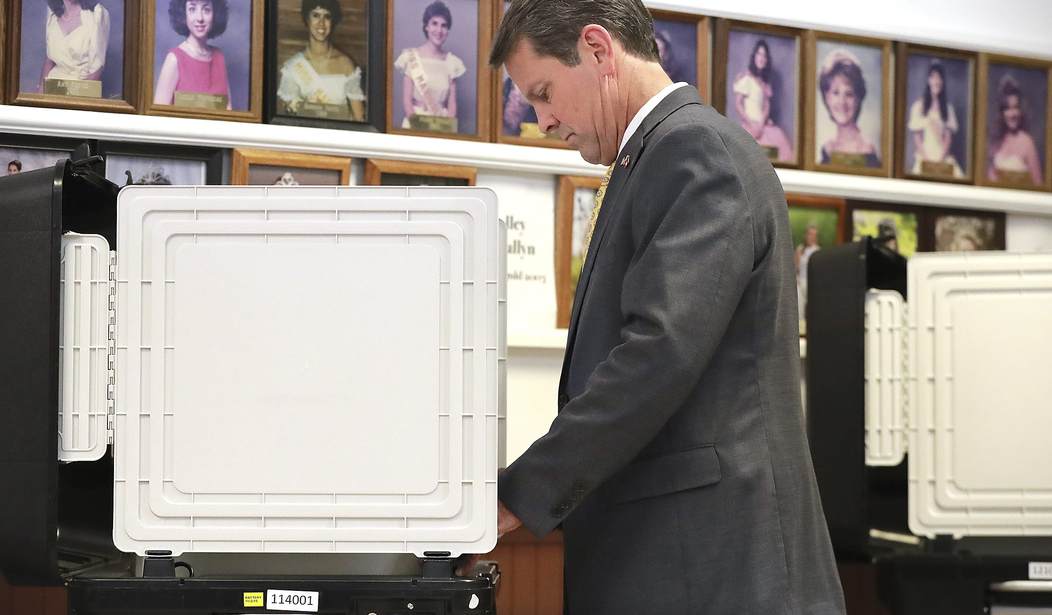Brian Kemp, Georgia’s secretary of state and the state GOP’s candidate for governor, branded allegations that his department allowed a massive breach that likely exposed the digital records of 6 million voters “fake news.” But cybersecurity is now a top election issue in Kemp’s gubernatorial run against Democrat Stacey Abrams.
However, Carol Anderson, a professor of African-American studies at Emory University, wrote in the New York Times that Kemp is more than a bureaucrat who’s fumbled Georgia’s cybersecurity ball; she charged him with being an “enemy of democracy.”
Anderson also opined that President Trump endorsed Kemp’s candidacy because the president needs four more years of Brian Kemp to complete two more years in the White House.
With just over two months before the November election, the Georgia governor’s election is either candidate’s to win or lose.
A July Gravis poll showed 46 percent of voters backing Stacey Abrams, while 44 percent said they’d vote for Brian Kemp. Ten percent of the voters surveyed had yet to make up their minds by the end of July.
A Survey USA-WXIA-TV voter poll flipped the percentages: 44 percent for Abrams and 46 percent for Kemp, with another 10 percent undecided.
Larry Sabato’s Crystal Ball and the Cook Political Report rate the race “Leans Republican,” while Real Clear Politics ranks it a “toss up.”
With the race that tight, Georgia Democrats have seized on the election cybersecurity issue to not only defeat Kemp in the gubernatorial election but also to call for his resignation as secretary of state.
“Too many of us fought too hard for anyone to put the sanctity of voting into question,” said Rep. John Lewis (D-Ga.). “Brian Kemp must follow the lead of past public servants on both sides of the aisle and resign immediately before voters doubt the integrity of the Secretary of State’s office. Secretary Kemp’s role as chief administrator of Georgia’s elections directly conflicts with his run for governor.”
Georgia uses electronic-only voting machines. There are no paper ballots that could be used to verify election results. Thirteen other states use the same electronic-only system. Cybersecurity experts said that while there hadn’t been any evidence of ballot manipulation by the Russians or anyone else, not having a paper trail left the electronic-only voting machine system open to fraud.
“And the machines they’re using are more than a decade old, so the hardware is falling apart. And the operating system they’re using is Windows 2000, which hasn’t been updated for security for years, which means it’s a sitting duck,” Zeynep Tufekci, a University of North Carolina information and library science professor, told NPR.
Washington offered help. Secretary of State Kemp refused.
“The question remains whether the federal government will subvert the Constitution to achieve the goal of federalizing elections under the guise of security,” Kemp wrote to the technology website Nextgov in an email.
“Designating voting systems or any other election system as critical infrastructure would be a vast federal overreach, the cost of which would not equally improve the security of elections in the United States,” Kemp added.
And look where that got us, said activist Caroline Stover during a Democratic campaign rally in Atlanta.
“Here we are. Three months before an important election, living with the reality that once again Georgia voters might be going to the polls and not know if your vote actually counts,” Stover said to a crowd of 100 Democrats as they sipped beers and ate tater tots at an Atlanta bar.
Well, guess what? Brian Kemp said the current system is “accurate and secure.” But he agrees changes need to be made. He wants to replace those old voting machines that are chugging along with the ancient Windows 2000 operating system.
Kemp’s put out a request for proposals from businesses that can sell Georgia new voting machines, complete with verifiable paper records. But to make the change before the November election would plunge Georgia’s voting system in chaos, according to Secretary of State spokeswoman Candice Broce.
Broce said Georgia has to wait until the 2020 election to make the switch to 21st-century voting technology.
“There is not enough time to acquire the right inventory, train local elections officials, educate voters, and ensure the necessary safeguards to prevent chaos at the polls if a judge orders Georgia to convert to a new system virtually overnight,” her statement said.
But the same day Broce issued that statement, Kemp told the Associated Press, “The hysteria of some people seeking to force Georgia to switch to an all-paper ballot system is based on misinformation, and making this change would spend money to create problems that we should avoid.”
Richard DeMillo, a professor of computing at Georgia Institute of Technology, told the Telegraph that “Kemp is on the extreme fringes of election officials who do not take threats to election security seriously. What he calls ‘misinformation’ is, in reality, an overwhelming body of evidence.”
In her New York Times op-ed, Carol Anderson alleged there’s an evil purpose to what Democrats see as Kemp’s maddening refusal to secure Georgia’s digital voting records. She believes it is all part of a master plan to keep Trump in office.
“Hackable polling machines, voter roll purges, refusing to register voters until after an election, the use of investigations to intimidate groups registering minorities to vote — Mr. Kemp knows it all,” Anderson wrote in the Times.
Trump, Anderson concluded, has endorsed Kemp because if the Republican wins in Georgia, the president will stay in the White House.
“Mr. Kemp can rubber-stamp the Legislature’s voter-suppression bills that privilege the Republican Party, artificially increase the Republican representation in Congress,” Anderson wrote, “and in the end protect a president facing mounting evidence of graft, corruption, conspiracy and the threat of impeachment.”









Join the conversation as a VIP Member